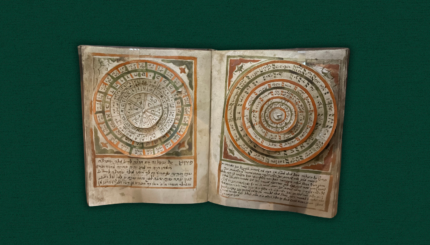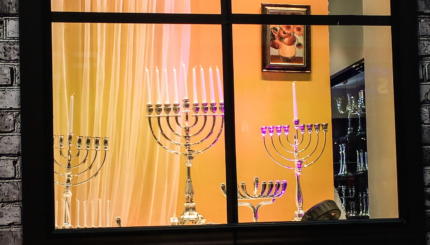The wise men of Chelm were elated with the etrog the president of their congregation had purchased for Sukkot. This was not an ordinary etrog. It came from the Land of Israel. It was yellow as the color of an etrog. It was fragrant as the odor of an etrog. It was without a blemish as an etrog. It had a firm and dainty pitma [stem]. In short, this was an etrog!
The president reluctantly entrusted the sexton to take the etrog to all the Chelm householders so that they could recite the traditional blessing over it. Apprehensive of the sexton’s carelessness, the president warned him. “Remember! This etrog is an etrog! Handle it with tenderness. Be especially careful that the pitma should not be spoiled by handling and thereby render the etrog unsuitable for use. Remember! This etrog is an etrog.”
The wise sexton joyfully embarked on his holy mission. Clutching the etrog in both hands, he started out through the streets of Helm, when a sudden inspiration stopped him in his tracks. He looked at the etrog, held it level with his eyes, and scrutinized it from all sides. Shutting his eyes in devout meditation, the sexton recalled the president’s instructions to take extreme precautions that the pitma should not be spoiled. Ah, he was shrewd! But what was the inspiration that brought him to a sudden halt? Had he forgotten his clever device? No! No! He knew what he had to do. No sooner said than done!
The sexton took a sharp knife from his pocket and carefully cut out the pitma from the etrog. The president had ordered him to take good care of it, and he would never dare disobey the president. He placed the pitma in a clean handkerchief and gently placed it in his pockets. He then proceeded to the homes of the wise Hhelmites to allow them to recite the blessing over the etrog.
With your help, My Jewish Learning can provide endless opportunities for learning, connection and discovery.
As the sexton entered each home, he reiterated the president’s admonition.
“Remember! This etrog is an etrog!”
Excerpted from The Sukkot/Simhat Torah Anthology. Reprinted with permission from the Jewish Publication Society.
etrog
Pronounced: ETT-rahg, Origin: Hebrew, a citron, or large yellow citrus fruit that is one of four species (the others are willow, myrtle and palm) shaken together as a ritual during the holiday of Sukkot.
lulav
Pronounced: LOO-lahv (oo as in boo), Origin: Hebrew, a bundle of branches representing three species -- willow, myrtle and palm -- which are shaken together with the etrog on Sukkot.
Torah
Pronunced: TORE-uh, Origin: Hebrew, the Five Books of Moses.


